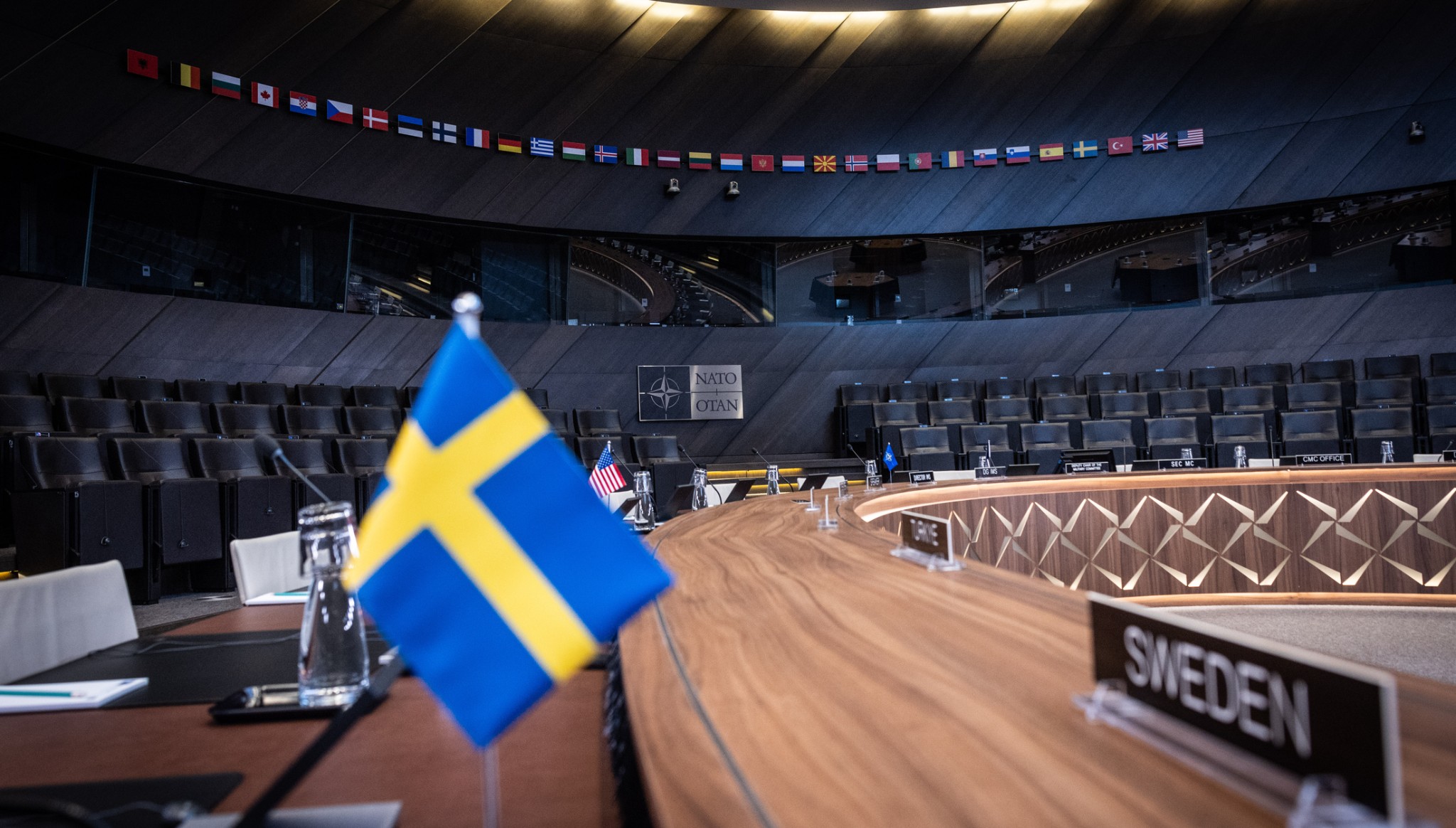 The Flag of Sweden is Installed in Room 1 as Sweden Became a Member of NATO, March 7, 2024. Image courtesy NATO.
The Flag of Sweden is Installed in Room 1 as Sweden Became a Member of NATO, March 7, 2024. Image courtesy NATO.
The New Kid on the Block: Sweden as a NATO Member
Amidst Russia’s escalating invasion of Ukraine, European leaders at the North Atlantic Treaty Organization (NATO) are striking an urgent but optimistic tone about the future of the alliance. On March 7, Sweden acceded to NATO following Turkey and Hungary’s termination of their accession blockades.
As a new member state of NATO, Sweden will have to address Russian expansionism and NATO collective burden sharing. Although these challenges threaten to undermine the transatlantic alliance’s stability, they also present opportunities for Sweden to further cement itself as a leader in transatlantic security.
Sweden’s Departure from Neutrality
Sweden maintained a position of neutrality stemming from its loss to the Russian Empire in the Napoleonic Wars. Surrendering Finland to Russia as the cost of losing was a substantial geopolitical blow, and Swedish leaders decided to prevent future losses by establishing a non-alignment policy. Sweden lent military aircraft to Finland in World War II, but the country maintained its neutrality over fears of a Nazi invasion. The country furthered maintained neutrality during the Cold War over fears of the Soviet Union invading Finland as retaliation.
As former Swedish Prime Minister Carl Bildt outlines, Sweden began abandoning neutrality following the collapse of the Soviet Union in 1991. In 1994, Sweden joined NATO’s Partnership for Peace program that fosters bilaterial relations between NATO and non-member states. In response, Russia threatened Sweden with military retaliation. Sweden was granted membership into the European Union (EU) in 1995, and the EU’s collective defense commitment to aid member states attacked by adversaries helped Sweden gain security. After Russia invaded Ukraine in February 2022, Swedish Foreign Minister Ann Linde signed Sweden’s application to join NATO out of fears of further Russian aggression.
Challenge #1: Countering Russian Aggression
As a new NATO member, Sweden must contribute to the alliance in ways that improve its own security by increasing the ability of the alliance to respond to Russian aggression.
Following Hungary’s cessation of its opposition to Sweden’s NATO accession, Russia announced its development of unspecified military-technical countermeasures to “protect itself” against Sweden. Russia’s announcement comes after years-long efforts to militarize its borders with Scandinavian countries and halt bilaterial cooperation. In September 2023, Russia left the Barents Euro-Arctic Council with Norway, Finland, and Sweden, claiming the countries “paralyzed” cooperation. Russia is also engaging in aggressive maritime behavior, allegedly severing communication cables to a Norwegian satellite ground station.
Sweden has thus far leveraged its alliances with Finland and Norway, but Sweden can further strengthen its position by bolstering security cooperation with European power players. Sweden, Norway, Denmark, and Finland are moving to share their air forces to create a “mini-NATO” that would allow NATO allies to streamline their air force capabilities to counter common threats. Chief of the Norwegian Air Force Major General Rolf Folland claimed that the formation of a “mini-NATO” structure could enable the creation of a joint Nordic center for air operations that could house American and Canadian forces. Sweden should continue developing these multilateral defense plans to enable NATO members to pool defense resources.
Challenge #2: Sharing the NATO Collective Defense Burden
To further establish itself as a strong ally, Sweden should link these efforts with increases in its defense commitments to NATO.
Under Article 3 of the North Atlantic Treaty, member states must be committed to “maintain and develop their individual and collective capacity to resist armed attack.” The 2014 Wales Summit Declaration further pledged that member states must increase their defense expenditures to 2% of their Gross Domestic Product (GDP) by 2024. Sweden is one of various member states that falls short of this commitment. In 2022, Sweden proposed to increase its defense expenditures to $12 billion by 2028, with $7.3 billion allocated to the 2022 budget line that is equivalent to around 1.45% of GDP.
As Sweden seeks to increase its expenditures to fulfill its commitment, it should utilize its comparative advantages to increase the effectiveness of its contribution to NATO. Sweden has a smaller military than other NATO allies but maintains one of the largest defense industries in Europe. The industry amounted to $3 billion in 2022, including companies like BAE Systems that produce sophisticated defense equipment. Dubbed the “Silicon Valley of Europe,” Sweden has robust technological capabilities stemming from its public-private partnerships, high-quality educational system, and institutions like the Centre for Cyber Defence and Information Security. Rather than focusing on manpower, Sweden can contribute by collaborating with technologically savvy member states like Estonia to fortify NATO’s cyber defense.
Conclusion
By countering Russian aggression and fulfilling its collective defense commitments, Sweden can solidify itself as a key player in NATO. After generations of neutrality, Sweden is entering a new era of allyship that can impact the alliance for future generations.





